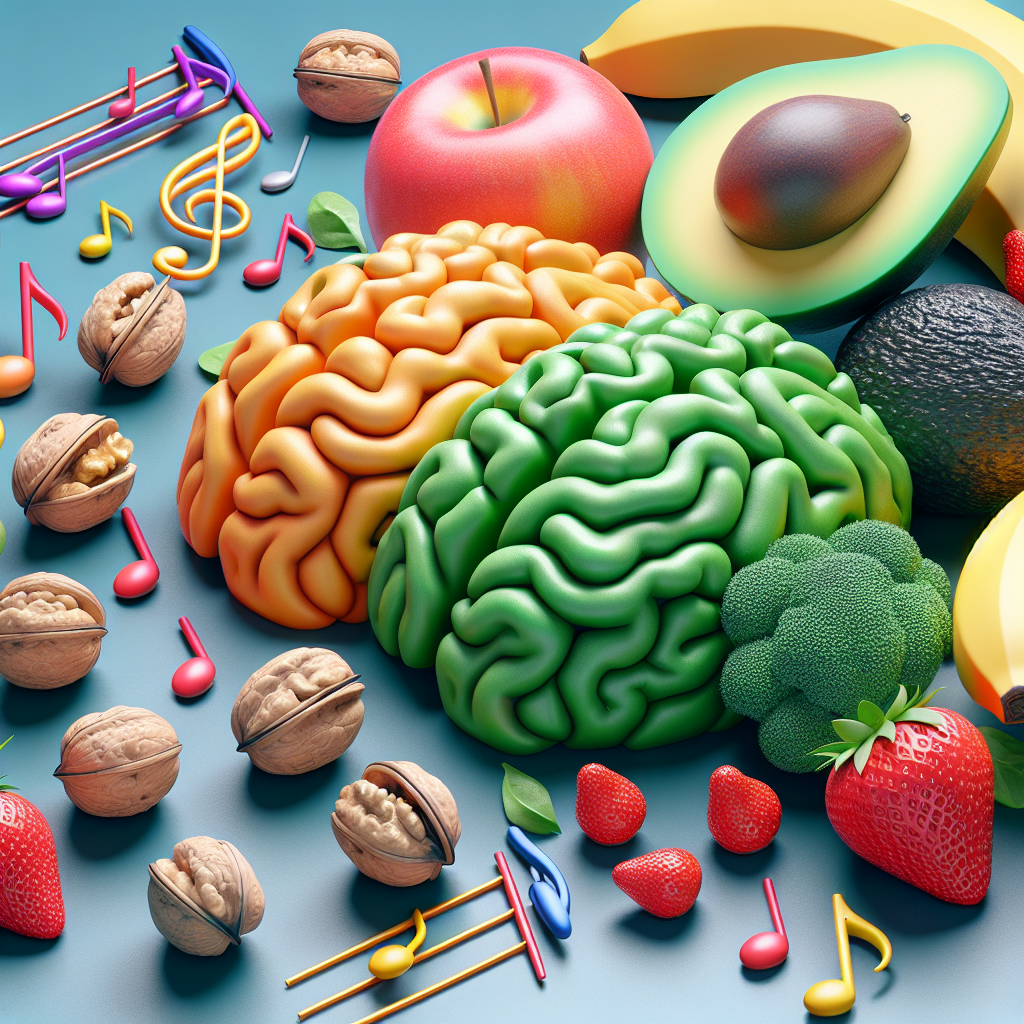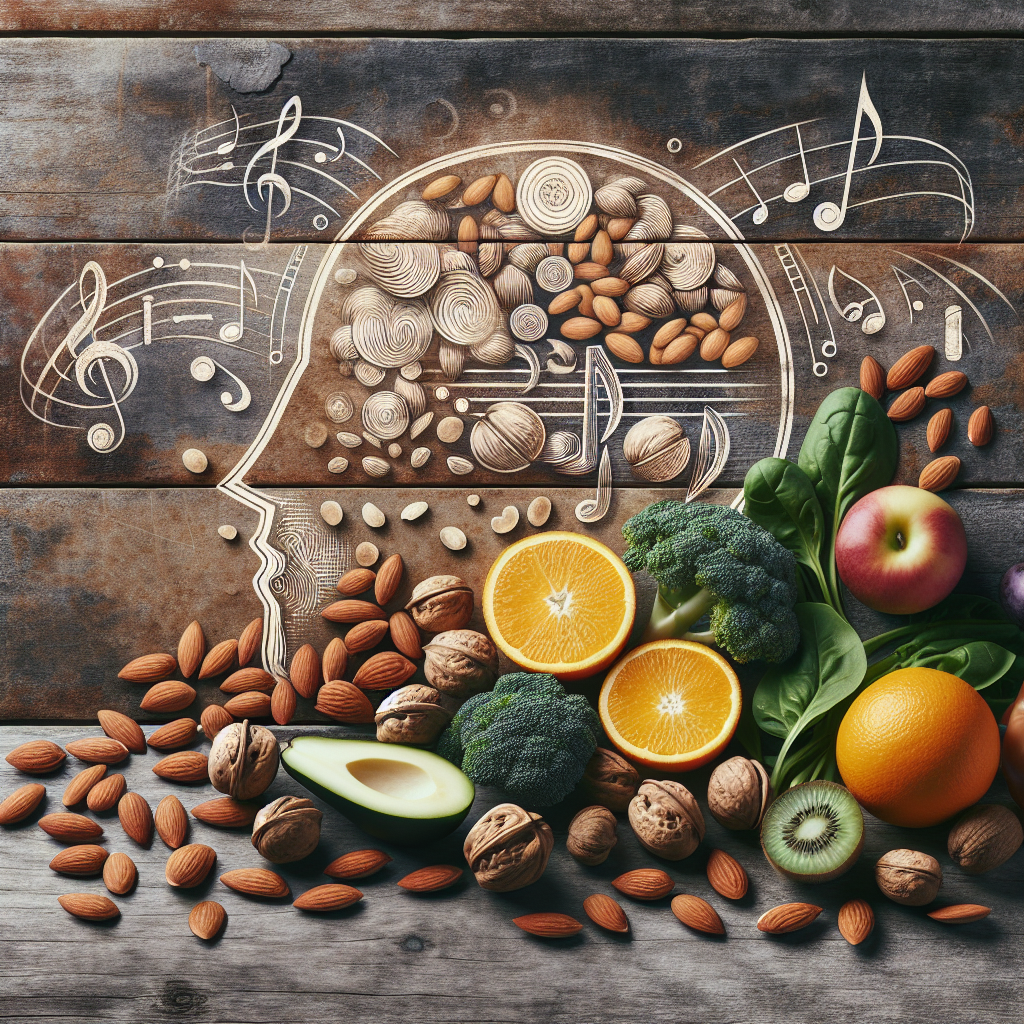Natural Vitamins that Support Mental Health for Musicians

Boost your mental health with our natural vitamins specially designed for musicians. Improve your focus, creativity, and overall well-being. Don’t wait, start your journey to a healthier mind today! Click here to learn more.
Exploring the Role of Natural Vitamins in Enhancing Musicians’ Mental Health
The mental health of musicians is a topic that has been gaining increasing attention in recent years. The unique pressures and demands of a career in music can often lead to stress, anxiety, and other mental health issues. However, there is a growing body of evidence suggesting that certain natural vitamins can play a significant role in supporting and enhancing mental health for musicians.
One of the most important vitamins for mental health is B-complex vitamins. These vitamins, which include B1, B2, B3, B5, B6, B7, B9, and B12, are essential for the proper functioning of the brain and nervous system. They help the body produce energy, create new blood cells, and maintain healthy skin cells, digestive tract cells, and nerve cells. A deficiency in any of these vitamins can lead to a range of mental health problems, including depression, anxiety, and even psychosis. Therefore, it is crucial for musicians to ensure they are getting enough B-complex vitamins in their diet.
Another key vitamin for mental health is vitamin D. This vitamin is unique because it can be synthesized in the skin in response to sunlight. However, many people, including musicians who often work indoors or at night, do not get enough exposure to sunlight and therefore may be deficient in vitamin D. This vitamin is essential for brain health, and a deficiency has been linked to depression, schizophrenia, and other mental health disorders. Musicians can increase their vitamin D levels by spending more time outdoors in the sunlight or by taking a vitamin D supplement.
Omega-3 fatty acids, while not technically a vitamin, are another essential nutrient for mental health. These fatty acids, which are found in fish, flaxseeds, and walnuts, are crucial for brain function and development. They also have anti-inflammatory properties, which can help reduce the inflammation that is often associated with mental health disorders. Musicians who do not consume enough omega-3 fatty acids may experience mood swings, depression, and decreased cognitive function.
Finally, antioxidants such as vitamins C and E are also important for mental health. These vitamins help protect the brain from oxidative stress, which is a type of damage that can occur when the body’s cells are exposed to free radicals. Oxidative stress has been linked to a variety of mental health disorders, including depression and anxiety. Musicians can increase their intake of antioxidants by eating a diet rich in fruits and vegetables, particularly those that are brightly colored.
In conclusion, while the pressures and demands of a career in music can often lead to mental health issues, there are natural vitamins that can help support and enhance mental health. Musicians should ensure they are getting enough B-complex vitamins, vitamin D, omega-3 fatty acids, and antioxidants in their diet. By doing so, they can help protect their mental health and ensure they are able to perform at their best.
The Impact of Essential Vitamins on Mental Wellness for Musicians

The life of a musician, while filled with creativity and passion, can also be fraught with stress, anxiety, and other mental health challenges. The pressure to perform, the irregular hours, and the constant scrutiny can take a toll on their mental well-being. However, a growing body of research suggests that certain natural vitamins can play a significant role in supporting mental health for musicians.
Vitamin B complex, for instance, is a group of eight vitamins that are essential for optimal brain function. They play a crucial role in producing brain chemicals that affect mood and other brain functions. Low levels of these vitamins, particularly B6, B9, and B12, have been linked to depression. Therefore, incorporating foods rich in these vitamins, such as whole grains, meat, eggs, and dairy products, or taking a B-complex supplement, can help musicians manage stress and mood swings.
Vitamin D, often referred to as the “sunshine vitamin,” is another essential nutrient that can support mental health. It is produced by the body in response to sunlight and can also be obtained from certain foods like fatty fish and fortified dairy products. Research has shown that vitamin D deficiency is associated with an increased risk of mood disorders, including depression and anxiety. For musicians who often work indoors and may not get enough natural sunlight, supplementing with vitamin D can be beneficial.
Omega-3 fatty acids, while not a vitamin, are worth mentioning due to their significant impact on brain health. These essential fats are crucial for brain function and development. They also have anti-inflammatory properties that can help protect the brain. Studies have shown that people who consume a diet rich in omega-3s have lower rates of depression. Musicians can benefit from including foods like fish, walnuts, and flaxseeds in their diet or taking an omega-3 supplement.
Antioxidants, such as vitamins C and E, are also vital for mental health. They help protect the brain from oxidative stress, which can damage cells and has been linked to mental health disorders. Musicians, who often lead hectic and stressful lives, can benefit from consuming a diet rich in antioxidants. Foods like berries, citrus fruits, nuts, and spinach are excellent sources of these vitamins.
Lastly, the mineral magnesium plays a significant role in brain function and mood. Low levels of magnesium have been linked to an increased risk of depression. Musicians can ensure they are getting enough magnesium by eating foods like almonds, spinach, and avocados or taking a supplement.
In conclusion, while the life of a musician can be mentally challenging, incorporating these essential vitamins and nutrients into their diet can provide significant support. It’s important to remember that while these vitamins can help support mental health, they are not a substitute for professional help if a musician is struggling with a mental health disorder. However, they can be a valuable part of a comprehensive approach to maintaining mental wellness in the demanding world of music.
Natural Vitamins: A Key to Mental Stability and Creativity for Musicians
Musicians, like any other professionals, need to maintain their mental health to perform at their best. The pressure to create, perform, and excel can sometimes lead to stress, anxiety, and other mental health issues. One way to support mental health is through the intake of natural vitamins, which can play a significant role in maintaining mental stability and boosting creativity.
Vitamin B complex, for instance, is known for its significant role in brain health. It comprises eight different vitamins, all of which contribute to optimal brain and nervous system function. B vitamins, particularly B6, B9, and B12, are crucial for the production of neurotransmitters, the chemicals that allow brain and nerve cells to communicate with each other. When these neurotransmitters are in balance, they can help reduce feelings of anxiety and depression, thereby promoting mental stability.
Moreover, B vitamins are also involved in the synthesis of serotonin, a neurotransmitter that contributes to feelings of happiness and well-being. A deficiency in these vitamins can lead to low serotonin levels, which is often associated with depression. Therefore, ensuring an adequate intake of B vitamins can help musicians maintain their mental health and enhance their creativity.
Another essential vitamin for mental health is Vitamin D. Often referred to as the “sunshine vitamin,” it is produced by the body in response to sunlight. However, it can also be obtained from certain foods and supplements. Vitamin D is known to play a role in mood regulation. It helps the brain produce serotonin, which, as mentioned earlier, contributes to feelings of well-being. A deficiency in Vitamin D can lead to mood disorders, including depression and anxiety. Therefore, musicians, especially those who spend a lot of time indoors, should ensure they get enough Vitamin D to support their mental health.
Omega-3 fatty acids, although not a vitamin, deserve a special mention for their role in brain health. These essential fats are crucial for brain function and development. They also have anti-inflammatory properties, which can help protect the brain from damage and aging. Studies have shown that people who consume a diet rich in Omega-3 fatty acids have a lower risk of depression. Musicians can benefit from including Omega-3 rich foods like fish, walnuts, and flaxseeds in their diet or taking supplements if necessary.
Lastly, let’s not forget about Vitamin C. This powerful antioxidant helps protect the brain from oxidative stress, a type of damage that can lead to mental decline. Vitamin C also plays a role in the production of neurotransmitters, making it essential for brain function and mood regulation. Musicians can get their daily dose of Vitamin C from fruits like oranges, strawberries, and kiwis, or from supplements if needed.
In conclusion, maintaining mental health is crucial for musicians to perform at their best. Natural vitamins like B complex, Vitamin D, and Vitamin C, along with Omega-3 fatty acids, can play a significant role in supporting mental stability and boosting creativity. However, it’s important to remember that while these vitamins can support mental health, they are not a substitute for professional help if a musician is struggling with serious mental health issues. Always consult with a healthcare provider for personalized advice.